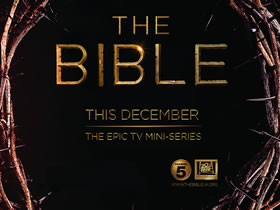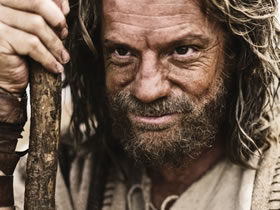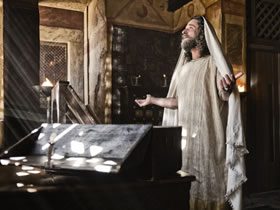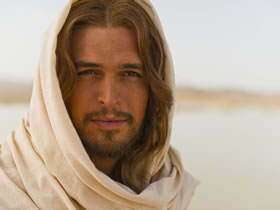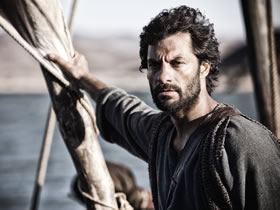Episode 2: Homeland
From the courage of Joshua, through the dilemmas of Samson, the anointing of Saul and his succession by David, to the birth of Solomon, we might think about the big themes of choice and consequences.
Like all historical texts, the Bible highlights certain aspects of the story which illustrate particular themes.
Why does the story emphasise the walls of Jericho miraculously falling down before Joshua attacks the city?
Just as in the rescue from Egyptian military might, we see that God calls his people to trust in him rather than relying on the weapons of war.
- Jericho is the first Canaanite city which the Israelites reach after crossing the Jordan river from the east.
- Right at the start of the conquest of Canaan, God challenges Joshua and the Israelites to trust him, not their own abilities.
- Trusting God and his power is an important theme throughout the Bible.
-
- '"Not by might nor by power, but by my Spirit,"' says the Lord Almighty.' (Zechariah 4:6)
- 'May the God of hope fill you with all joy and peace as you trust in him, so that you may overflow with hope by the power of the Holy Spirit.' (Romans 15:13)
- The Bible is not just history or guidance for life, but the revelation of a supernatural God who offers to transform us through his power if we trust him
Both Samson and Delilah make choices that have a dramatic impact on their own lives and those around them. How does the story develop the consequences of their actions?
Once again we see the cycle of 'sin, judgement and grace'. Samson and Delilah choose to do wrong and consequently he loses his strength and she loses her relationship. The story ends with God freely giving Samson back his strength, which enables him to continue his mission. But even then, he and Delilah cannot escape all of the consequences of their actions.
- Samson's calling from birth is to be a Nazirite (Judges 13:5) – that is, dedicated to God in special ways, including avoiding alcohol and never cutting his hair.
- Although he is called by God and physically very strong, Samson is morally very weak, and most of his choices are motivated by selfishness, lust, and vengeance.
- Samson's poor choices eventually result in him being completely at the mercy of the enemy Philistines, and his physical blindness reflects his moral blindness.
- When God restores his strength he can return to his mission of saving the Israelites from the Philistines, but he dies in the process.
Why do you think the story emphases that even when Saul is trying to kill him, David refuses to take matters into his own hands when he has the chance?
This is one of the high points in David's relationship with God. Even when he can't see God's plans working out in his life, he still trusts in God and does not use the sword to get what he believes is right.
- David knows that he has been anointed by the prophet Samuel to be the next king of Israel, but he also accepts that Saul was currently the anointed king.
- He trusts God to resolve the situation, so he continues to respect Saul's kingship and will not even speak against him, let alone kill him:
-
- 'May the Lord judge between you and me. And may the Lord avenge the wrongs you have done to me, but my hand will not touch you.' (1 Samuel 24:12)
- The early Christians also trusted God to deal with the authorities who were opposed to them:
-
- 'Now, Lord, consider their threats and enable your servants to speak your word with great boldness. Stretch out your hand to heal and perform signs and wonders through the name of your holy servant Jesus.' (Acts 4:29–30)
After David chooses to take Bathsheba the story focuses on the consequences for others (Uriah, Bathsheba and the baby) what is that meant to tell us?
With the David and Bathsheba story we see how disobedience travels like dye in water – it cannot be limited to one area of our lives but finds a way to corrupt and damage everything.
- After years of putting God first in his life, David begins to put his desires and reputation first.
- Having started down this path, he creates a difficult set of circumstances for himself and for Bathsheba, which he makes much worse by trying to cover it up.
- After being challenged by the prophet Nathan (see 2 Samuel 12:1–15), David repents and is forgiven:
-
- Have mercy on me, O God, according to your unfailing love; according to your great compassion blot out my transgressions. Wash away all my iniquity and cleanse me from my sin. For I know my transgressions, and my sin is always before me. (Psalm 51:1–3)
- Sin is never entirely private. Even though sin can be forgiven, it always has consequences for others, either directly or indirectly:
-
- 'Do not be deceived: God cannot be mocked. A man reaps what he sows. Whoever sows to please their flesh, from the flesh will reap destruction; whoever sows to please the Spirit, from the Spirit will reap eternal life.' (Galatians 6:7–8)
Despite what David had done, his son Solomon goes on to lead the nation and build the temple. Why do you think the story continues in that way?
Even though David has sinned, and even though he and his family face the consequences, God still keeps his promises to David and his descendants. Despite the faithlessness of his chosen people, God continues with his plan to offer full forgiveness and transformation to everyone who will receive it, throughout the whole world.
- David starts well – full of faith in God and his power to rescue his people – but becomes morally weak after being king for some time.
- However, God continues to act in grace (undeserved kindness) to David and his family. He had chosen David and his descendants to be a line of kings who, at their best, reveal something of what God's rule is like – not because David is more holy than anyone else, but because he trusts God.
- The prophet Nathan tells David that his son (Solomon) will be the one to build the temple, and that God has an eternal plan for his lineage:
-
- 'Your house and your kingdom shall endure for ever before me; your throne shall be established for ever.' (2 Samuel 7:16)
- As Old Testament history proceeds, it becomes clear that this promise does not mean that there will be an unbroken chain of David's descendants as kings over an earthly kingdom (it ends with the Babylonian exile in the sixth century BC).
- A thousand years after David, his direct descendant, Jesus, is born. The angel Gabriel tells Mary what is to happen and makes a direct connection back to Nathan's promise to David:
-
- 'Do not be afraid, Mary; you have found favour with God. You will conceive and give birth to a son, and you are to call him Jesus. He will be great and will be called the Son of the Most High. The Lord God will give him the throne of his father David, and he will reign over Jacob's descendants forever; his kingdom will never end.' (Luke 1:30–33)

